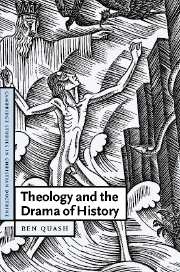Book contents
- Frontmatter
- Contents
- Acknowledgements
- List of abbreviations
- Introduction
- 1 Dramatizing theology
- 2 Freedom and indifference
- 3 Epic history and the question of tragedy
- 4 Eschatology and the existential register
- 5 Analogy's unaccountable scaffolding
- 6 Theodramatics, history and the Holy Spirit
- Postscript
- Select bibliography
- Index
Postscript
Published online by Cambridge University Press: 22 September 2009
- Frontmatter
- Contents
- Acknowledgements
- List of abbreviations
- Introduction
- 1 Dramatizing theology
- 2 Freedom and indifference
- 3 Epic history and the question of tragedy
- 4 Eschatology and the existential register
- 5 Analogy's unaccountable scaffolding
- 6 Theodramatics, history and the Holy Spirit
- Postscript
- Select bibliography
- Index
Summary
I dreamt our world lost careful hold of time
Instead of March the daffodils became
A Yellow-while when smell is in the air,
When green explodes and warmth upon the back
Is neither too much nor a dream denied. …
Only the old believe in metal tongues
Communal hours secure and understood,
The rest of us must do the best we can
Each pocketing his own continuum.
Though Jacob on the sand had little need
Of face of watch (to him the angel spoke)
Yet we have luminosity controlled,
Each wink asserts possession of the scythe.
Fear not, for when the church bells cease to ring
In darkest night we'll be sure of the hour.
(sally bushell)Postscript
Theodramatics needs time. More than that, it relishes time, instead of trying to mitigate its effects. While ‘lyric’ tries to find a medium for the operation of subjective self-consciousness which is not timeable, and ‘epic’ narrates time under closure and in that way seeks to manage it, drama blurs the frame. A good theodramatics will regard this as one of drama's virtues. As we said in chapter 1, drama is the art form truest to life and the manifestation of complex, pluriform, multiply interpreted truth in changing circumstances.
The way drama achieves its ends, as we saw right at the beginning in attending to the dramatic wealth and intensity of Aeschylus' Agamemnon, is to explode the fantasy that one can have ‘careful hold of time’.
- Type
- Chapter
- Information
- Theology and the Drama of History , pp. 219 - 221Publisher: Cambridge University PressPrint publication year: 2005



